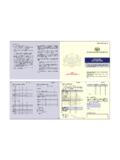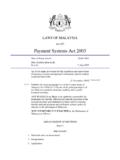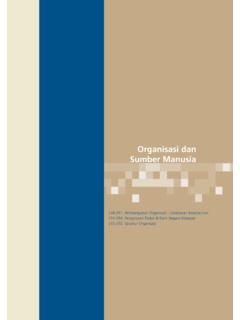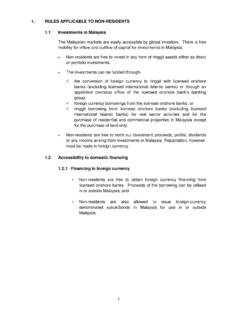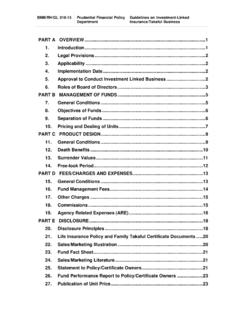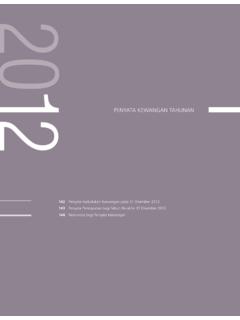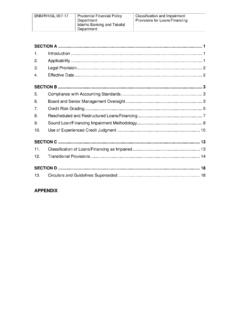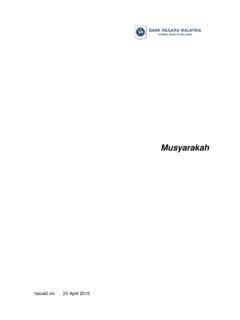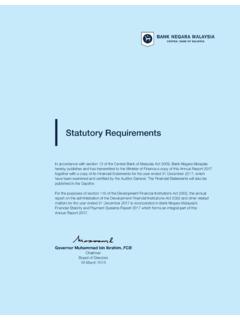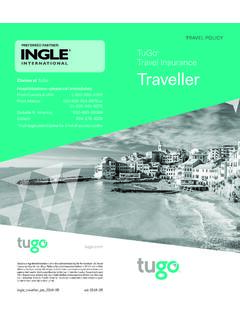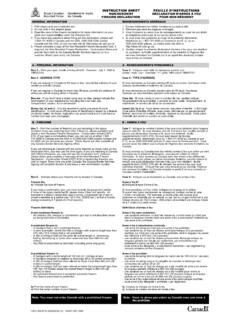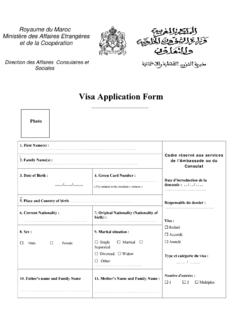Transcription of Annex: Exchange Control Policies - Central Bank of Malaysia
1 P1 AnnexExchange Control PoliciesThe Exchange Control Policies in Malaysia are directed at monitoring the settlement of payments and receipts aswell as encouraging the use of the country s financial resources for productive purposes. There is generally freemobility of inward and outward movement of funds, subject to the statistical requirement of completing Forms Pfor payment and Forms R for receipts, for transfers exceeding the equivalent of RM10,000. There are also a fewprudential regulations covering approval requirements for large borrowings from abroad as well as overseasinvestments by following are the major Exchange Control rules:ICurrent Account Transactions(a)Payments for Import of Goods and Services There are no restrictions on payments to non-residents for imports of goods and services.
2 Such payments must be made in foreign currencies.(b)Export Proceeds All export proceeds are required to be repatriated back to Malaysia in accordance with the payment schedule as specified in the sales contract, which in any case should not exceed six months from the date of export. Export proceeds must be received in foreign currency and must be sold for ringgit or retained in approved foreign currency accounts with resident commercial banks, with up to an aggregate overnight limit of between USD1 million and USD10 million.(c)Import and Export of Currency by Travellers Import and export of ringgit up to RM1,000 and export of foreign currency up to an equivalent of RM10,000 is freely permitted. Resident travellers are required to obtain permission and declare in the Traveller s Declaration Form (TDF) when they carry currency notes and/or traveller s cheques as listed below.
3 Resident travellers carrying into or out of Malaysia , ringgit notes exceeding RM1,000. Residents carrying out foreign currency notes including traveller s cheques exceeding the equivalent of RM10,000. Approval is given within one day of application. Non-residents are free to bring in any amount of foreign currency and/or traveller s cheques. Declaration in the Disembarkation Card issued by the Immigration Department is only required for amounts in excess of the equivalent of USD2,500. Non-residents must also declare ringgit exceeding RM1,000 being brought into or out of Account Transactions(a) Foreign Direct Investment Foreign direct investors are freely allowed to repatriate their investments, including capital, profits, dividends and content/cover2001 11/10/2002 04:03PM Page 1P2(b) Investment Abroad by Residents Residents, other than commercial banks and approved merchant banks, are required to seek prior approval from the Controller to remit funds in excess of RM10,000 for overseas investment purposes.
4 Consideration of applications is based on a set of transparent criteria. Commercial banks and approved merchant banks are freely permitted to invest abroad as long as theycomply with the Banking and Financial Institutions Act, 1989 and their approved net open position limit. Remittance for investments abroad must be made in foreign currency.(c) Foreign Currency Credit Facilities from Non-Residents Residents are freely permitted to obtain credit facilities in foreign currency up to the equivalent of RM5 million in the aggregate from licensed banks, licensed merchant banks and non-residents. Any amount exceeding the permitted limit would require the prior approval of the Controller. Where the aggregate amount exceeds the equivalent of RM1 million, the resident must provide the Controller information on the credit facilities.
5 There is no restriction for repayment of credit facilities obtained as long as such credit facilities have been obtained in accordance with the relevant Exchange Control Policies .(d)Ringgit Credit Facilities from Non-Residents Residents are not allowed to obtain credit facilities in ringgit from non-residents without the prior approval of the Controller.(e)Extension of Credit Facilities to Non-ResidentsForeign Currency Credit Facilities Commercial banks are freely allowed to extend credit facilities in foreign currency to non-residents for any purpose. However, credit facilities extended for the acquisition or development of immovable property in Malaysia would be subject to similar conditions as for ringgit credit facilities extended for the purpose outlined below: Ringgit Credit Facilities Non-bank residents are allowed to extend credit facilities in ringgit to non-residents not exceeding the aggregate of RM10,000.
6 Resident stockbroking companies are allowed to extend margin financing facilities to non-resident clients for the purchase of shares listed on the Kuala Lumpur Stock Exchange (KLSE), provided they comply with all the relevant rules imposed by the KLSE. Resident insurance companies are allowed to extend policy loans in ringgit to its non-resident policy holders not exceeding the attained cash surrender value of the Policies at all times for a duration not exceeding the duration of the policy. Resident financial institutions are allowed to extend credit facilities in ringgit to non-residents to finance the purchase or construction of any property in Malaysia (excluding for the purchase of land only), subject to their own internal credit assessment guideline.
7 Resident companies are allowed to extend credit facilities to their non-resident employees subject to terms and conditions of employment to finance the purchase or construction of property (excluding the purchase of land only) in Malaysia . annex content/cover2001 11/10/2002 04:03PM Page 2P3 annex A non-resident may only obtain, at any one point in time, a maximum of three property loans (including loans obtained in foreign currency and from resident companies under the terms and conditions of employment and from resident financial institutions). All purchases are subject to the guidelines issued by the Foreign Investment Committee (FIC). Resident banking institutions are allowed to extend credit facilities in ringgit up to the aggregate of RM200,000 to a non-resident for purposes other than to finance the acquisition or development of immovable property in Malaysia .
8 The above is in addition to credit facilities extended for the purchase of one vehicle for own use. Prior approval of the Controller is required for the extension of credit facilities exceeding the limit. Licensed banks and Bank Islam Malaysia Berhad are allowed to extend ringgit overdraft facilities in aggregate not exceeding RM200 million on intra-day basis and not exceeding RM10 million on overnight basis to non-resident stockbroking companies and non-resident global custodian banks. Theconditions are that the facility would be strictly for financing funding gaps due to unforeseen or inadvertent/technical administration errors or time zone delays in relation to settlement of trades on the Swap/Forward Authorised dealers are allowed to enter into short-term currency swap arrangements with non-resident stockbrokers and non-resident global custodian banks to cover payment for their share purchases on the KLSE.
9 Authorised dealers are also allowed to enter into an outright ringgit forward sales contract with non-residents for the same purpose. The permission is subject to the condition thatsuch contracts are based on firm commitment and not on anticipated purchases, and with maturity period of up to three working days with no rollover option.(f) Portfolio Investments Non-resident portfolio investors are freely allowed to repatriate their principal sum and profits out of the country at any time (The exit levy system was abolished on 2 May 2001).IIIR inggit Credit Facilities to Non-Resident Controlled Companies A resident is freely allowed to extend credit facilities in ringgit to a Non-Resident Controlled Company (NRCC) operating in Malaysia of up to an aggregate limit of RM10 million per corporate group and any amount of short-term trade financing where the tenure does not exceed 12 months.
10 The NRCC is required to obtain prior approval from the Controller for domestic borrowing exceeding RM10 million in aggregate and to comply with the 3:1 gearing ratio requirement between its domestic debt and eligible capital funds. Of the total amount of credit facilities extended to any NRCC by banking institutions in Malaysia , foreign-owned banking institutions may extend credit facilities up to a maximum of 50%, with the balance from Malaysian-owned banking of Ringgit Private Debt Securities NRCCs are generally permitted to raise domestic credit facility through the issuance of ringgit Private Debt Securities regardless of amount, in accordance with the Exchange Control Guideline on Private Debt Securities. However, the NRCCs must comply with the 50:50 rule and the 3:1 ratio.
